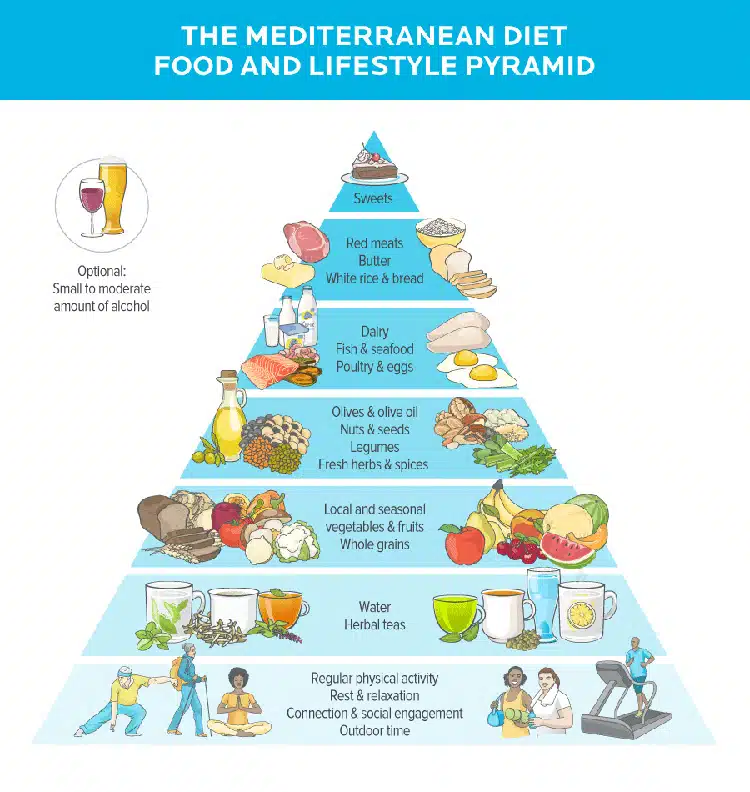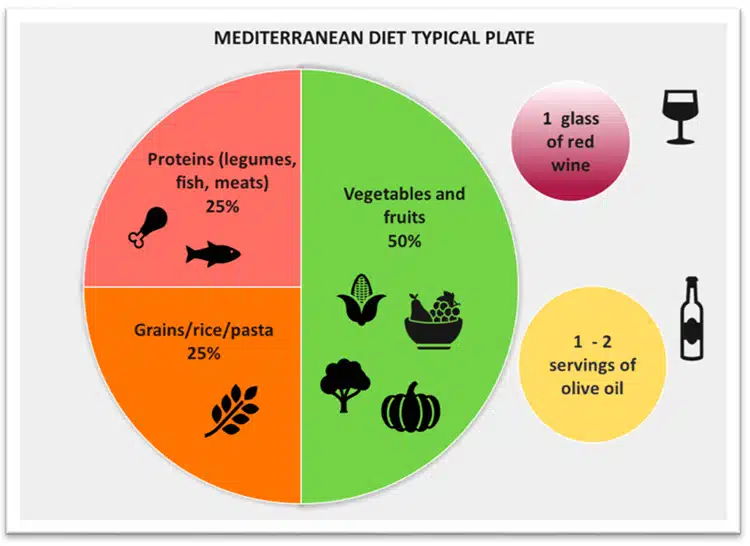One of the women in PCOS Foodies recently asked about the benefits of the Mediterranean diet for PCOS. Of course, I jumped straight to the medical articles and found some really useful insight into the benefits of this type of diet for women with PCOS.
Although research on PCOS and the Mediterranean diet is scarce, studies do show that the diet helps manage chronic inflammation, type 2 diabetes, improves gut health, and may also improve fertility in women with PCOS (1).
In this article, let’s have a closer look at this way of eating and how it might be helpful for people with PCOS.
What is the Mediterranean Diet?
The traditional Mediterranean diet is a style of eating that emphasizes fresh fruit and vegetables, fish, nuts, and olive oil. It’s a way of eating similar to vegetarianism but containing some animal products such as eggs and dairy.
Due to the emphasis on fresh fruit and vegetables and whole grains, the Mediterranean diet is typically low in processed foods high in saturated fat.
One of the defining characteristics of a Mediterranean diet is its emphasis on plant-based foods. Compared to meat, produce is the focus of a meal as it provides more color and variety.
White breads are almost non-existent on the menu, and red meat is reserved for special occasions.
We know that a PCOS Diet is so important for women with PCOS. So, the next big question is, “Can the Mediterranean Diet improve the Symptoms of PCOS?”
Let’s have a closer look at this.
The Benefits of the Mediterranean Diet for PCOS
The Mediterranean Diet can help with the chronic inflammation we see in PCOS.
We know that women with PCOS experience chronic low-grade inflammation. This is part and parcel of the syndrome that is Polycystic Ovarian Syndrome.
Research shows that the Mediterranean diet can help reduce systemic inflammation (2). This is helpful as any decrease in chronic inflammation will also lead to an improvement in insulin sensitivity, thereby improving PCOS symptoms.
The Mediterranean Diet can help with Insulin Resistance
Research suggests that 50-70% of women with PCOS also experience insulin resistance, which leads to weight gain, an irregular menstrual cycle and an increased risk of cardiovascular disease (3).
Following a Mediterranean diet has been shown to help with blood glucose control, and lowers fasting levels of insulin, increasing insulin sensitivity (4).
This improved insulin sensitivity is why drugs like Metformin or supplements like Inositol are so helpful in women with PCOS.
Increased insulin sensitivity can help with:
- weight loss
- improved menstrual cycle
- ovulation
- decrease in cravings and so much more
The Mediterranean Diet helps with Fertility
We know that PCOS is one of the leading causes of infertility in women of reproductive age.
A new study, published in Human Reproduction, found that women who adhere to the Mediterranean-style diet have a higher chance of having successful pregnancies and giving birth (5).
In fact, women who ate more fresh vegetables, fruit, whole grains, legumes, fish and olive oil, and less red meat, had a 65-68% greater likelihood of achieving a successful pregnancy and birth compared to women with the lowest adherence to the Mediterranean-style diet.
What’s more, previous research suggests that adherence to the Mediterranean diet may also help improve semen quality.
So, if you are trying to conceive, following a Mediterranean diet could be helpful for both you and your partner.
The Mediterranean Diet may Help to Lower Testosterone Levels in women with PCOS
We know that the Mediterranean diet is high in Omega 3 and healthy oils. Research also shows that Omega 3 helps to lower testosterone levels in women with PCOS.
One piece of research also showed that women with PCOS who did not follow a Mediterranean diet tended to have higher testosterone levels (6).
Lower testosterone levels will help with acne, hair growth, and male pattern baldness.
The Mediterranean Diet Improves Gut Microbiome
Women with PCOS tend to have a less diverse gut microbiome in comparison to women without PCOS and this can have a massive impact on our overall health and PCOS symptoms.
Researchers have found that following a Mediterranean diet can help improve the health, diversity, and function of the gut microbiome, which would also improve general health and wellness, as well as PCOS symptoms (7).
The Mediterranean Diet Improves Non-Alcoholic Fatty Liver Disease
Women with PCOS are more prone to developing NAFLD than women without PCOS. Researchers have found that following the Mediterranean diet for 12 months improves liver fat and insulin sensitivity, irrespective of weight loss (8).
The Mediterranean Diet has Many other Health Benefits
So, we have seen that the Mediterranean diet is anti-inflammatory, helpful in managing insulin resistance, lowers testosterone levels, and can help improve fertility and fatty liver disease as well as other PCOS symptoms.
It’s starting to sound pretty promising.
But here is the thing. There are a lot of other ways that the Mediterranean diet could help with PCOS symptoms.
For example, women who follow the Mediterranean diet have been shown to have a lower risk of cardiovascular disease.
Research has also found that a Mediterranean-style diet may help with weight loss (9). Another study found that a Mediterranean diet helps to prevent Type 2 Diabetes in metabolically healthy but obese older adults.
Even more, research shows that following a Mediterranean diet can help to prevent and treat breast cancer (10).
So, it seems that the Mediterranean diet could have many other beneficial effects on PCOS.
The Mediterranean Diet vs a Western Diet
Now that we have seen how the Mediterranean diet could help with some of the most common PCOS symptoms, let’s take a look at what makes it different from a typical western diet.
The Mediterranean diet is rich in fruits, vegetables, whole grains, legumes, and fish. It emphasizes olive oil as its main source of fat.
On the other hand, a western diet tends to be higher in red meats, refined sugars, and trans fats. It also focuses on processed foods and snacks that are highly refined or fried. The consumption of sugary drinks is also high in the western diet.
So we need to focus on whole, unprocessed foods, legumes, and whole grains with good quality oils and nuts as opposed to the highly processed foods so commonly found in a standard American diet.
What we can learn about a Mediterranean Lifestyle for PCOS
We take a lot of dietary strategies from the Mediterranean lifestyle but there are is also a lot that we can learn from the lifestyle as a whole.
This is a helpful infographic from Precision Nutrition:
Eat Locally Produced Foods
Eating locally sourced and grown foods are associated with healthier eating habits, less processed food, obesity prevention, and a decreased risk of chronic diseases.
This means eating foods that are in season and cooking with fresh, whole foods instead of canned or frozen.
It also means encouraging the local farmers in your area to grow more fruits, vegetables, fish, and other natural foods. You can do this by supporting them financially through buying from their stalls at farmer’s markets as well as having a good relationship with your local farmers.
Eating Slowly
Eating slowly is one of the best ways to improve digestion and manage hunger. It helps us feel more satisfied after meals (something that women with PCOS tend to struggle with).
What you Should Actually Eat
So, now that we know that this way of eating can be beneficial for our PCOS hormones and overall symptoms, you might be wondering what should actually be on your plate.
The Mediterranean diet does tend to be higher in carbohydrates and lower in protein than I normally recommend for women with PCOS. However, the carbs are low GI, unprocessed carbs that will have less of an impact on insulin levels than processed carbs.
Protein should be primarily from legumes and fish with red meat being enjoyed very occasionally.
Healthy fats from oils and nuts are also an important part of this way of eating.
The good news is that research shows that eating with way is easier to stick to over the long term than many other diets.
Sample meals
If this way of eating is something you would like to try, let me give you some ideas for each meal of the day.
Breakfast
Wake up with a glass of warm lemon water. This will help to kick start your metabolism and cleanse your digestive system first thing in the morning.
For breakfast, you could have poached eggs with avocado, olives and herbs on top.
This is rich in protein and healthy fats as well as lots of vitamins, minerals and antioxidants.
Lunch
For lunch, you could make a big salad bowl with lots of different vegetables like kale, broccoli, carrots, cucumber and tomatoes.
You could also add some beans or chickpeas for protein and whole grains such as quinoa or brown rice.
As a dressing, you can use extra virgin olive oil (yes more oily goodness).
Supper
For dinner, you could have grilled fish with lots of lemon and herbs as well as roasted veggies or lentils for protein.
This meal is high in protein, healthy fats, vitamins and minerals and moderate levels of fat (around 25 grams).
I’m getting hungry just thinking about all of that! It sounds delicious! Not only are these meals super healthy, but they are also high in fibre and fat which will help you feel fuller for longer.
Tips for success and troubleshooting tips
So, if you are ready to make a change and begin adopting this way of eating, here are some tips for success and troubleshooting tips to help you on your way.
As with any change in your diet, it is important to not jump into anything too drastic or restrictive and rather increase things slowly.
Keep a food diary at first so that you can get an idea of how many calories you are consuming and where they are coming from.
Focus on protein, healthy fats and vegetables first instead of worrying too much about grains or carbohydrates. All those things can be added slowly as you begin to feel comfortable with the diet changes.
Summing it all Up
The Mediterranean diet is promising for women with PCOS and metabolic syndrome. Although research on this topic is scarce, the dietary principles of eating plenty of plant-based foods like vegetables, fruits, whole grains, nuts and seeds help manage chronic inflammation as well as type 2 diabetes symptoms such as high blood sugar levels or insulin resistance.
In fact, 33% of women with PCOS also have metabolic syndrome which means that they are at a higher risk for developing heart disease or stroke – something that can be mitigated by following the Mediterranean diet!
Have you tried it? Let me know how it went in the comments below!
- sustainable pcos weight loss strategies
- Over 5500 women have done it and seen results
- [bonus] Done for you pcos meal plans
- [bonus] intermittent fasting for pcos course
- [BONUS] personalised nutrition plan
JOIN OVER 5,500 OTHERS
References
1 Chandrasekaran, S; Sagili, H. Metabolic syndrome in women with polycystic ovary syndrome. THE OBSTETRICIAN AND GYNAECOLOGIST, 2018.
2 Casas, R; Sacanella, E; Estruch, R. The immune protective effect of the Mediterranean diet against chronic low-grade inflammatory diseases. ENDOCRINE, METABOLIC & IMMUNE DISORDERS – DRUG TARGETS, 2014.
3 Ovalle, F; Azziz, R. Insulin resistance, polycystic ovary syndrome, and type 2 diabetes mellitus. FERTILITY AND STERILITY, 2002.
4 Martín-Peláez, S; Fito, M; Castaner, O. Mediterranean Diet Effects on Type 2 Diabetes Prevention, Disease Progression, and Related Mechanisms. A Review. NUTRIENTS, 2020.
5 Karayiannis, D; Kontogianni, M; Mendorou, C; et al. Adherence to the Mediterranean diet and IVF success rate among non-obese women attempting fertility. HUMAN REPRODUCTION, 2018.
6 Barrea, L; Arnone, A; Annunziata, G; et al. Adherence to the Mediterranean Diet, Dietary Patterns and Body Composition in Women with Polycystic Ovary Syndrome (PCOS). NUTRIENTS 2019.
7 Nagpal, R; Shively, C; Register, T; et al. Gut microbiome-Mediterranean diet interactions in improving host health. F1000RESEARCH 2019.
8 Torres, M; Aghemo, A; Lleo, A; et al. Mediterranean Diet and NAFLD: What We Know and Questions That Still Need to Be Answered. NUTRIENTS 2019.
9 Mancini, J; Filion, K; Atallah, R; et al. Systematic Review of the Mediterranean Diet for Long-Term Weight Loss. THE AMERICAN JOURNAL OF MEDICINE 2015.
10 Shaikh, A; Braakhuis, A; Bishop, K. The Mediterranean Diet and Breast Cancer: A Personalised Approach. HEALTHCARE 2019.










